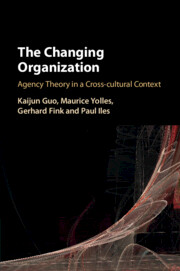8 - Agency Dynamics
from Part II - Agency Change
Published online by Cambridge University Press: 10 November 2016
Summary
Introduction
Agencies naturally pass through processes of change, and pressures to do so might come from within the organization and/or from its environment. A relatively simple way of evaluating the change process through which the imperatives for change can be explored is through its dominant paradigm, where it has one. The idea of the paradigm became well known through the work of Kuhn (1970) in his exploration of the development and dynamics of scientific paradigms. However, plural agencies also have paradigms that constitute a map of their natures. Where there is a dominant paradigm, then there is no ambiguity in this nature, but where there are competing paradigms, so we enter the realm of dynamic complexity and perhaps even organizational chaos. In the latter case the agency will likely experience cultural cleavage that will interfere with the capability to perform. The demise of a dominant paradigm is not the demise of the agency, which can shift to a new paradigm in order to maintain viability.
Paradigms are conceptual patterns of thought, ideology, and pragmatism that begin life through an agency's appreciations of their apprehended epistemic truths. Any coherent autonomous durable human activity group has the ability to form a culture, and develops both cognitive interests and purposes that will form a paradigm which lives through, and represents the nature of, that agency. Within it, ideological appreciations are formulated which guide the group operationally. These appreciations are meant as a somewhat reflective view of a situation, with both cognitive and evaluative aspects. They might also be called attitudes with reflection that under the special conditions may be transformed into goals. Formulated systemically, they become appreciative systems (Vickers, 1965) that appear as generalized versions of appreciations that allow the membership of a plural agency to give accounts of a variety of situations.
Paradigms exist through their set of belief-based propositions, and it is this that creates their conceptual form. Following Duverger (1972), when the beliefs are logically rationalized and systemized so that they coalesce figuratively (in the sense of Piaget, 1950) to establish a phenomenal potential to explain experience, they may be referred to as ideology. The ideological system of thought is manifested as narrative when the potential for experience is used to shape knowledge into story (Yolles, 2007). According to this view, paradigmatic narrative is ideological dogmatism when it not only facilitates story, but also logically constrains it.
Information
- Type
- Chapter
- Information
- The Changing OrganizationAgency Theory in a Cross-Cultural Context, pp. 231 - 262Publisher: Cambridge University PressPrint publication year: 2016
